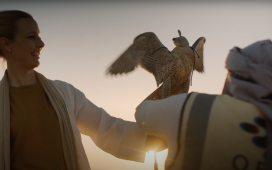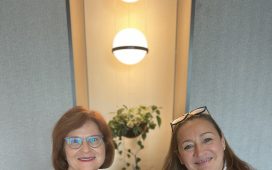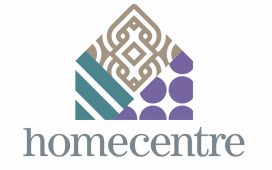A few weeks ago a 38-year-old play by Ziad Rahbani broke box office records in Lebanon. The popular reaction to the cinematic release of Bennesbeh Labokra, Chou? (What about tomorrow?) surprised many, but its triggering of Lebanon’s collective memory has proved a moment of truth for the company behind its resurrection.
Originally performed during an eight-month run at the Orly Theatre in Beirut in 1978, the complete original cast recording of Bennesbeh Labokra, Chou? had been released on the Zida record label the same year, ensuring the play’s survival in audio format. However, the existence of footage of the play, shot by Rahbani’s sister Layal, was unknown by all except a few. It wasn’t until m.media (M) acquired the rights to turn the play into a film that any inkling of the possibility of a cinematic release became apparent.
The end result has been something special. The film achieved 28,000 admissions during its first day, more than Star Wars: The Force Awakens achieved in its entire opening weekend in Lebanon, and Bennesbeh Labokra, Chou? is expected to become the highest grossing Lebanese film of all time. It opened in the United Arab Emirates in mid-February and will be followed later this year by the release of another Rahbani play, Film Ameriki Taweel.
“This is not about the play’s sentences that everyone has memorised, or the songs that are engrained in our memories, even mine,” wrote blogger Elie Fares on A Separate State of Mind after seeing the film for the first time. “This is about the entire experience: from [the] film, to seeing the sheer joy on the faces of those watching it, to their reaction to finally seeing the play they’ve known so well on screen in the way that it is.”
Bennesbeh Labokra, Chou? reveals the aspirations of M, a Beirut-based digital start-up dedicated to the digitisation of Lebanese culture and that of the wider Arab world. Currently in beta, having launched in December last year, the three years it took to turn the play into a film can be viewed as a message of intent. Not only was it willing to undergo lengthy negotiations with Rahbani – a composer, pianist and playwright – but also to select, clean and assemble original footage from several different performances before embarking on hefty restoration work and extensive editing.
“The film was made and released because it is something from our collective memory and our collective culture,” says Moe Hamzeh, head of programming at M. “And this is part of the whole M plan – to create a cultural platform. Not just for Lebanon, but for the wider Arab world. Because Lebanon never had a set-up that allowed all of its cultural work to be available to be viewed by the public. Even the old archives. And there are so many jewels that need someone to uncover them, to polish them and bring them back to life.”
Why launch with Bennesbeh Labokra, Chou?
“Because it is considered a classic and yet nobody knew it had been filmed,” replies Hamzeh. “Ziad’s sister Layal had filmed the play on a Super 8 camera across several shows and rehearsals, not for the purpose of releasing it, but to enable Ziad to improve the performances of the actors and to enhance the play. They were then kept in a drawer somewhere until we heard of them and convinced Ziad to let us digitise them. We had to work on the picture quality in Hollywood and the sound in Germany and the end product – what you see in the cinema – is our first piece of original work.”
M stands for a digitised culture, says Hamzeh. In essence, an online compilation of films, plays and documentaries from Lebanon and the wider Middle East. It has launched with an initial selection of movies and series that are available to stream, with Bennesbeh Labokra, Chou? a taster of what’s to come.
“We’ve been working on the project for more than three years,” says Hamzeh. “Phase one is the global Lebanese version, which is what you see online now, but eventually we will grow and focus on Middle East culture as a whole. It doesn’t talk purely to the Lebanese, it talks to anyone who’s interested in our culture. Which is why documentaries done by any director or producer or journalist that have a subject matter related to us and have an interest in us are also being featured.
“We’re also pushing a lot of new talent and featuring all types of formats – from feature films to documentaries, short films and even student films – and part of our strategy is original content. We started with Ziad’s filmed play, we have another one in the pipeline, and we are producing a documentary, web series and short films.”
Founded in 2012 by the Quantum Group, which also includes the Beirut office of M&C Saatchi and multimedia content management, acquisition and development company Mercury, the online platform received a cash injection in February when the Levant Investment Bank acquired a 12.5 per cent stake in the company. The remaining shares are owned by the Quantum Group and Charles El Hage.
It was sister company Mercury that helped M produce Bennesbeh Labokra, Chou?, with the start-up rolling out three business models that it hopes will ensure it remains a viable proposition. The first is an ad-based service that provides access to content for free, while a subscription model offering ad-free premium content will be launched later this year. A pay-per-view and download service will also be added.
One of its primary objectives is to solve the problem of access to a cultural past that is in danger of sliding into obscurity. Films such as Farouk Beloufa’s Nahla, which is set amongst a group of leftist friends in 1970s West Beirut; André Voisin’s Carrefours du monde: Beyrouth 1975; and Hubert Knapp and Jean-Claude Bringuier’s 1967 cinematic biography of Kamal Jumblatt. Full bodies of work by filmmakers such as Maroun Bagdadi, arguably Lebanon’s most prominent director, will be added via the creation of artist pages. The films of more contemporary directors, such as Philippe Aractingi, Bahij Hojeij and Nadine Labaki, will also being included.
“It is said that when asked to cut arts funding to help the war effort, Winston Churchill answered: ‘Then what are we fighting for?’,” says Hamzeh in response to questions of why it is important to preserve, digitise and publish art from Lebanon’s past. “It is our duty to preserve the past, especially our cultural and artistic history, and make it available to the existing generation and generations to come. We are the sum of our memories and it is crucial that we expose cultural work from the past and highlight many forgotten works.”
Amongst these works are Hojeij’s 1998 documentary Kidnapped and André Chammas’ short film Notre Dame des Seins. A five-hour multimedia biography of Bachir Gemayel, the controversial Phalangist leader and president elect who was assassinated in Achrafieh in 1982, will be released later this year. Produced by Mercury, it is one of the original pieces of content M is working on.
For Hamzeh, who has been with M since the beginning and is a former general manager of Melody Music, the promotion of work by a new generation of filmmakers and artists is of paramount importance. “Cultural evolution is mainly driven by supporting young talent and by giving them the possibilities to unleash their potential,” he says. “M aims to be the launching pad for local Lebanese and Middle Eastern creators – filmmakers, writers, musicians – allowing them to express and demonstrate their ideas and give them the best exposure to the world.”
And Bennesbeh Labokra, Chou? Is he proud of what M has achieved with Rahbani’s play?
“We worked on it from scratch,” he replies. “That’s something we’re proud of and we’re glad that we brought this to life again. Because it’s not about the here and now, it’s about putting it in a format that can remain forever.”









